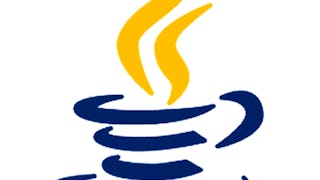- Browse
- Java
Java Courses
Java courses can help you learn object-oriented programming, data structures, exception handling, and multithreading concepts. You can build skills in writing efficient algorithms, debugging code, and developing user interfaces. Many courses introduce tools like Eclipse and IntelliJ IDEA, which are commonly used for coding and testing Java applications, along with frameworks such as Spring and Hibernate that facilitate web development and database management.
Popular Java Courses and Certifications
 Status: Free TrialFree TrialD
Status: Free TrialFree TrialDDuke University
Skills you'll gain: File I/O, Java Programming, Software Design, Debugging, Software Engineering, Javascript, Computer Programming, Event-Driven Programming, Encryption, Algorithms, Image Analysis, AI Personalization, Program Development, Data Processing, Statistical Analysis, Data Import/Export, Predictive Modeling, Integrated Development Environments, Data Analysis, Cascading Style Sheets (CSS)
4.6·Rating, 4.6 out of 5 stars22K reviewsBeginner · Specialization · 3 - 6 Months
 Status: NewNewStatus: Free TrialFree Trial
Status: NewNewStatus: Free TrialFree TrialSkills you'll gain: Object Oriented Programming (OOP), File I/O, Data Persistence, Object Oriented Design, Java, Java Programming, File Management, Application Development, Maintainability, Software Design, Programming Principles, Development Environment, Program Development, Computer Programming, Data Structures, Data Management, Integrated Development Environments, Debugging, Data Validation
4.7·Rating, 4.7 out of 5 stars176 reviewsBeginner · Specialization · 3 - 6 Months
 Status: Free TrialFree TrialStatus: AI skillsAI skills
Status: Free TrialFree TrialStatus: AI skillsAI skillsSkills you'll gain: Software Development Life Cycle, Cloud-Native Computing, Software Architecture, Hibernate (Java), Database Design, Responsive Web Design, Docker (Software), Containerization, Git (Version Control System), GitHub, Object Oriented Programming (OOP), CI/CD, Restful API, Large Language Modeling, Java Programming, Model Deployment, Engineering Software, Version Control, Database Management, Software Design
4.6·Rating, 4.6 out of 5 stars7.2K reviewsBeginner · Professional Certificate · 3 - 6 Months
 Status: Free TrialFree Trial
Status: Free TrialFree TrialSkills you'll gain: Java Programming, Java, Development Environment, Computer Programming, Integrated Development Environments, Object Oriented Programming (OOP), Data Structures, File I/O, Debugging
4.6·Rating, 4.6 out of 5 stars125 reviewsBeginner · Course · 1 - 3 Months
 Status: Free TrialFree TrialL
Status: Free TrialFree TrialLLearnQuest
Skills you'll gain: Eclipse (Software), Java, Java Programming, Integrated Development Environments, Development Environment, Computer Programming, Programming Principles, Object Oriented Programming (OOP), Debugging
4.6·Rating, 4.6 out of 5 stars2.2K reviewsBeginner · Course · 1 - 4 Weeks
 Status: Free TrialFree TrialA
Status: Free TrialFree TrialAAmazon
Skills you'll gain: File I/O, Object Oriented Programming (OOP), Object Oriented Design, Java, Software Design, Maintainability, Debugging, Data Structures
4.3·Rating, 4.3 out of 5 stars86 reviewsBeginner · Course · 1 - 4 Weeks
What brings you to Coursera today?
 Status: Free TrialFree TrialB
Status: Free TrialFree TrialBBoard Infinity
Skills you'll gain: Angular, HTML and CSS, Data Structures, Spring Boot, Eclipse (Software), Restful API, Java Programming, Object Oriented Programming (OOP), Model View Controller, Java, Front-End Web Development, Spring Framework, Object Oriented Design, Integrated Development Environments, Javascript, Software Design Patterns, Web Components, Development Environment, Web Applications, Cascading Style Sheets (CSS)
4.4·Rating, 4.4 out of 5 stars833 reviewsIntermediate · Specialization · 1 - 3 Months
 Status: Free TrialFree TrialL
Status: Free TrialFree TrialLLearnQuest
Skills you'll gain: Java Programming, Java, File I/O, Eclipse (Software), Object Oriented Programming (OOP), Object Oriented Design, Integrated Development Environments, Development Environment, Software Design, Computer Programming, Application Frameworks, Programming Principles, Virtual Machines, Web Development, Debugging, Data Persistence, Package and Software Management, Data Structures
4.6·Rating, 4.6 out of 5 stars2.8K reviewsIntermediate · Specialization · 3 - 6 Months
 Status: Free TrialFree TrialUD
Status: Free TrialFree TrialUDMultiple educators
Skills you'll gain: Unit Testing, Data Structures, Event-Driven Programming, File I/O, Interactive Data Visualization, Java, Java Programming, User Interface (UI), Object Oriented Programming (OOP), JUnit, Debugging, Object Oriented Design, Computer Programming, Cryptography, Software Engineering, Performance Tuning, Algorithms, Data Analysis, Software Design, Problem Solving
4.6·Rating, 4.6 out of 5 stars15K reviewsBeginner · Specialization · 3 - 6 Months
 Status: PreviewPreviewO
Status: PreviewPreviewOOracle
Skills you'll gain: Java, Object Oriented Programming (OOP), Oracle Cloud, Computer Programming, Cloud Development, Integrated Development Environments, Development Environment
4.6·Rating, 4.6 out of 5 stars36 reviewsBeginner · Course · 1 - 4 Weeks
 Status: PreviewPreviewH
Status: PreviewPreviewHHeriot-Watt University
Skills you'll gain: Object Oriented Programming (OOP), Java, Java Programming, Computer Programming, Application Development, Programming Principles, Computational Logic, Software Development, Debugging, Data Structures
Build toward a degree
Beginner · Course · 1 - 4 Weeks
 Status: Free TrialFree TrialD
Status: Free TrialFree TrialDDuke University
Skills you'll gain: Debugging, Java, Algorithms, Java Programming, Program Development, Programming Principles, Statistical Analysis, Software Design, Computer Programming, Data Import/Export, Integrated Development Environments, File I/O, Data Processing, Software Documentation, Data Manipulation, Object Oriented Programming (OOP), API Design, Data Analysis, Software Testing, Problem Solving
4.6·Rating, 4.6 out of 5 stars8.1K reviewsBeginner · Course · 1 - 3 Months
In summary, here are 10 of our most popular java courses
- Java Programming and Software Engineering Fundamentals: Duke University
- Java Programming Fundamentals: IBM
- IBM Java Developer: IBM
- Java Programming for Beginners: IBM
- Introduction to Java: LearnQuest
- Programming with Java: Amazon
- Java FullStack Developer: Board Infinity
- Core Java: LearnQuest
- Object Oriented Programming in Java: University of California San Diego
- Oracle Java Foundations: Oracle
Frequently Asked Questions about Java
Java is a versatile, high-level programming language that has become a cornerstone of modern software development. Created in the mid-1990s, Java is known for its portability across platforms, thanks to the Java Virtual Machine (JVM). This means that Java applications can run on any device that has the JVM installed, making it a popular choice for web applications, mobile apps, and enterprise-level software. Its importance lies in its widespread use in various industries, including finance, healthcare, and technology, as well as its role in developing Android applications and large-scale systems.
A variety of job opportunities are available for those skilled in Java. Common roles include Java Developer, Software Engineer, Backend Developer, and Application Developer. Additionally, positions such as Java Architect and Java Consultant are also in demand, especially for those with experience in enterprise applications. Companies often seek Java professionals for their ability to build robust, scalable applications, making this skill set highly valuable in the job market.
To learn Java effectively, you should focus on several key skills. First, understanding the basics of programming concepts such as variables, control structures, and data types is essential. Next, familiarize yourself with object-oriented programming principles, which are fundamental to Java. Additionally, learning about Java libraries and frameworks, such as Spring and Hibernate, can enhance your development capabilities. Familiarity with databases and version control systems like Git will also be beneficial as you progress in your Java journey.
There are numerous online courses available to help you learn Java. Some of the best options include the IBM Java Developer Professional Certificate and the Core Java Specialization. These programs cover a range of topics from foundational concepts to advanced techniques, providing a comprehensive learning experience tailored to different skill levels.
Yes. You can start learning Java on Coursera for free in two ways:
- Preview the first module of many Java courses at no cost. This includes video lessons, readings, graded assignments, and Coursera Coach (where available).
- Start a 7-day free trial for Specializations or Coursera Plus. This gives you full access to all course content across eligible programs within the timeframe of your trial.
If you want to keep learning, earn a certificate in Java, or unlock full course access after the preview or trial, you can upgrade or apply for financial aid.
To learn Java, start by choosing a structured course or specialization that fits your current skill level. Begin with the basics, focusing on syntax and fundamental programming concepts. Practice coding regularly to reinforce your learning, and consider working on small projects to apply what you've learned. Utilize online resources, forums, and communities to seek help and share your progress. As you gain confidence, gradually explore more advanced topics and frameworks.
Java courses typically cover a range of topics, including basic syntax, control structures, data types, and object-oriented programming principles. Advanced courses may explore into frameworks like Spring, database connectivity, and software design patterns. Additionally, many courses incorporate hands-on projects to help you apply your knowledge in real-world scenarios, enhancing your learning experience.
For training and upskilling employees, the Java FullStack Developer Specialization and the Java Development Deep Dive Specialization are excellent choices. These programs provide comprehensive training that covers both front-end and back-end development, equipping employees with the skills needed to tackle a variety of Java-related projects effectively.










